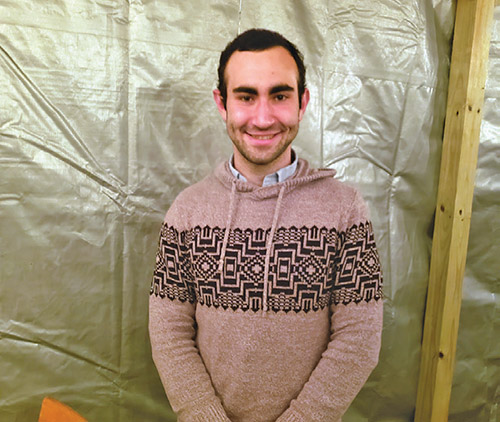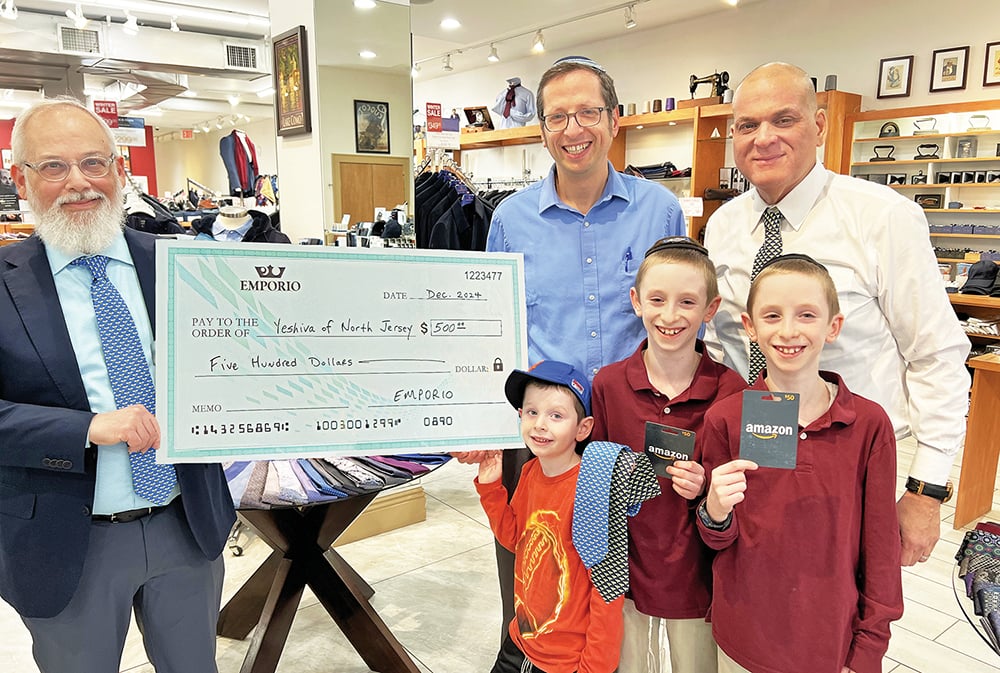

While it’s undoubtedly true that COVID-19 has had a dramatic effect on colleges in general and on Jewish campus life in particular, the impact has not been uniformly dismal. Jason Blatt of Highland Park, student president of Rutgers Hillel, spoke about some of the current challenges and successes of Jewish life at Rutgers University at a presentation on Tuesday, November 10, at the Bridge Kosher Turkish & Mediterranean Grill in Highland Park.
Blatt began by noting the distinctions within Hillel and Rutgers in pre-COVID and COVID environments. Pre-COVID, students of all Jewish denominations would gather at the Hillel building on College Avenue for activities and prayer, with the Friday night dinners a particularly popular draw. The dinners were a wonderful way to introduce Jews and Judaism to the Rutgers community. It was easy to network with so many students gathered together and entice students to attend upcoming sessions and events. As an example, Blatt related how members of the Rutgers basketball team came to one of the Friday night dinners, a feat that would be impossible now.
In the COVID environment, Rutgers Hillel has become creative in bringing events to students across the state as the majority of students have remained at home due to remote learning and closed dormitories. Hillel organizers set up a Road Show with meetings at parks and outdoor areas and posted the locations on their Facebook page. Blatt noted that students were so eager for opportunities to safely socialize that they would drive 10-15 minutes to go to a park, yet would not make time to walk less than five minutes to get to the Hillel building in a normal semester.
With the building closed, Hillel’s Orthodox contingent also felt the loss of daily minyanim. To retain the sense of community, daily afternoon services were started in Blatt’s backyard. The outdoor services attracted locally based Rutgers students as well as those renting off-campus housing in New Brunswick. Blatt admitted he was not sure how much longer outdoor services could continue into the colder weather.
Rutgers has approximately 6,400 Jewish undergraduate students (18% of the undergraduate population), many of whom have confronted issues of anti-Semitism from professors and Students for Justice in Palestine (SJP) in prior semesters. Two professors—Michael Chikindas, a professor in the food science department and a veteran professor in the food science department, and English department associate professor Jasbir Puar—engaged in activities that crossed the line into blatant anti-Semitism. The SJP came into the Hillel building to protest an event and ultimately were escorted from the premises by Rutgers University Police.
While there was no sugar coating of these events, Blatt said that Hillel’s sponsorship of interreligious round-table discussions and leading efforts for groups to dialog with and understand one another has been important. Blatt noted that he had to live in a designated dorm as a freshman in the Honors College. His roommate was the only other observant Jew in the building, and other students were amazed that the two of them woke up early every morning to attend prayer services—even when their classes did not start until the afternoon. College students are not known as early risers, and this kiddush Hashem started a dialog with other groups. Blatt also shared that he is taking Arabic as a minor, and has used the ability to speak Arabic as another way to open doors to discussion.
Blatt summed things up by saying there will be struggles to communicate and connect, but new ways will need to be found to make the connections with Jewish students and the Rutgers community at large. Without Friday-night dinners and the Hillel building to hang out in, people can’t get together. The silver lining is using technology to engage current students and alumni. Using Zoom, alumni can join in on events no matter where they live, and the diversity of speakers and activities has increased because of the lack of travel time needed. For example, a recent program featured an African-American Jew who experienced both racism and anti-Semitism and whose personal history and heritage included two groups who experienced institutionalized slavery.
On the other hand, Blatt acknowledged that it could be difficult to entice students to join yet another Zoom meeting after they have been sitting in front of their laptops all day for classes and preparing their assignments.
Benjamin Stolz, a Rutgers senior from Warren, New Jersey, was glad he chose to come to Blatt’s talk. There were three or four other events he could have attended, but this one had both food and subject matter that appealed to him..
Michael Garber, mashgiach/front-end manager of the restaurant, noted that Blatt’s presentation is part of a series of speakers The Bridge has hosted since the end of the summer. The restaurant’s proximity to the university and the fact that many customers are of college age or have college-aged children made the topic compelling.
The Bridge accommodates limited indoor dining (per mandated limits) and outdoor dining in a spacious tent adjacent to the restaurant.
By Deborah Melman
�













